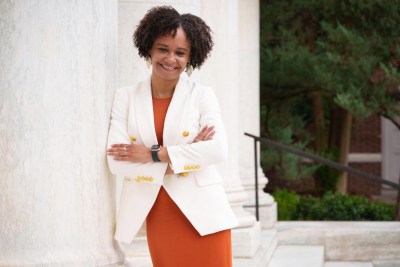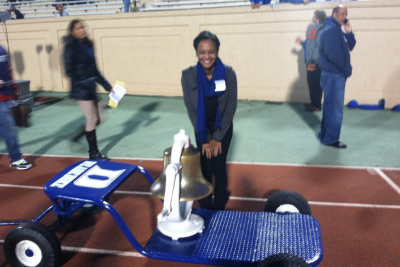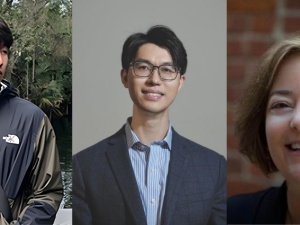Sports and Society Course Applies Anthropological Practice to our Obsession with Athletes

As a Duke undergraduate, Tracie Canada took The Anthropology of Sport with Professor Orin Starn — a course she remembers as formative to her engagement with anthropology and eventually leading to her Ph.D. at the University of Virginia.
Today, Assistant Professor Tracie Canada focuses her ethnographic research on the experiences of athletes, and Black college football players, in particular. And in Fall 2022, she got the opportunity to teach the Duke course in which she was once enrolled, tweaking the syllabus to include more voices of junior faculty, postdoctoral associates and recent graduates of Ph.D. programs who are examining sports across broad array of fields.
Sports can provide a lens into capitalism, race and racism, rhetoric, history, sociology and even the ways that geography can inform human experience, Canada said during an interview about the renamed Sports and Society course. The guest scholars who joined her throughout the fall semester via Zoom highlighted each of these themes and more. They included Jen Fry, who previously worked in the Undergraduate Research Support Office at Duke, as well as Samantha White, Anna Posbergh, and Constancio Arnaldo.
“It was fascinating to hear how their research related to the topics we were currently discussing in class,” said Amrita Lakhanpal, a senior in the course. “I think my favorite, though, was Dr. Aaron Dial. We talked about what it means to have a sneaker named after you, such as the Jordan brand or Lebron sneakers, and who is granted this opportunity versus who may miss out on it. We spoke about the relationship that sneaker companies have with athletes and their brands, highlighting the role that this plays in their success.
“It brought more context into our discussion of the business side of sport that many professional and, now, college athletes have to manage alongside their physical fitness and expertise to ensure the development of their overall brand and identity,” she added.
Nicole Monsalve, a Duke junior majoring in Psychology, described the rewarding experience of learning to apply “a more critical lens” to a universal pastime.
“It sounds simple, but it has changed the way I think, talk about and watch sports,” Monsalve said. “When I’m listening to games on TV or the radio or engaging with sports posts on media, I catch myself noticing details I would have never thought to pay attention to: how certain players are spoken about, who and what gets highlighted, variances in language used when discussing different sports, races, genders, etc. It has been cool to catch on to certain trends and be able to have more meaningful discussions about the games and players we all love so much.”
Paying that kind of close attention to the seemingly insignificant, and seeing the world differently as a result, is exactly what Canada hopes to imbue in her students. She can also relate to a tension Monsalve hinted toward and that other students felt in considering the cultural forces just underneath the surface of all systems.
“I was a Duke student, too,” Canada says. “I know what it means to be invested deeply in the teams at this university. Just because we love something doesn’t mean we can’t critique it.”
The co-existence of those activities and emotions, which are not mutually exclusive, was not lost on Lakhanpal either.
“By bringing in current events and news stories related to sport to evaluate each class, we learned to take the time to uncover the truth of a situation, collecting all the details, before forming our opinions,” the senior Computer Science major noted.
“This course revealed the unfairness and injustice that holds true throughout this realm, whether it be on the line of race, gender, socioeconomic status or a number of other factors. However, it also reaffirmed my love for sport, regardless of the craziness that lies within it, which is a feeling that is clearly shared throughout the world.”
Sports and Society (CULANTH 151S) will be offered again in Fall 2023.
Tracie Canada is also a member of the project team behind Black in Blue: The Duke Sports and Race Project, and recently received a Duke Intellectual Community Planning Grant to support further critical study of “big-time college sport” in partnership with colleagues at the University of North Carolina.



